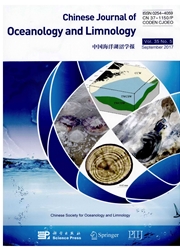

 中文摘要:
中文摘要:
To explore the impact of environmental variables on macroalgal communities, their temporal and spatial distributions were examined along the Yantai coast, China between April 2010 and March 2011. Macroalgae sampling was conducted monthly at four sites along the coast: Jiahe River estuary, Zhifu Island, Fisherman’s Wharf, and Yangma Island. The species composition and abundance, and their relationship with environmental variables were assessed. Along the Yantai coast, 35 macroalgae species were identifi ed, including 24 Rhodophyta spp., 7 Chlorophyta, and 4 Phaeophyta spp. Highest species numbers were recorded in the summer at all sampling sites, except in the Jiahe River estuary. Macroalgae biomass was the greatest in the summer. Year-round, the highest species number and dry biomass recorded at Fisherman’s Wharf and Yangma Island was attributed to the substrate type. In summer, Ulva pertusa Kjellman was the dominant species identifi ed along the Yantai coast, which indicates a risk of macroalgae blooms. Our results show that seawater temperature and nutrients appear to signifi cantly affect the temporal and spatial patterns of macroalgal abundance along the Yantai coast. The effects of environmental variables on the macroalgae on the Yantai coast need further study.
 英文摘要:
英文摘要:
To explore the impact of environmental variables on macroalgal communities, their temporal and spatial distributions were examined along the Yantai coast, China between April 2010 and March 2011. Macroalgae sampling was conducted monthly at four sites along the coast: Jiahe River estuary, Zhifu Island, Fisherman's Wharf, and Yangma Island. The species composition and abundance, and their relationship with environmental variables were assessed. Along the Yantai coast, 35 macroalgae species were identified, including 24 Rhodophyta spp., 7 Chlorophyta, and 4 Phaeophyta spp. Highest species numbers were recorded in the summer at all sampling sites, except in the Jiahe River estuary. Macroalgae biomass was the greatest in the summer. Year-round, the highest species number and dry biomass recorded at Fisherman's Wharf and Yangma Island was attributed to the substrate type. In summer, Ulva pertusa Kjellman was the dominant species identified along the Yantai coast, which indicates a risk ofmacroalgae blooms. Our results show that seawater temperature and nutrients appear to significantly affect the temporal and spatial patterns of macroalgal abundance along the Yantai coast. The effects of environmental variables on the macroalgae on the Yantai coast need further study.
 同期刊论文项目
同期刊论文项目
 同项目期刊论文
同项目期刊论文
 期刊信息
期刊信息
